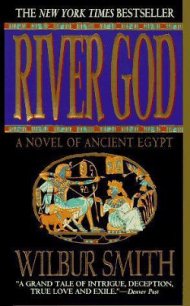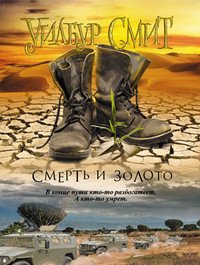Men of Men - Smith Wilbur (онлайн книга без txt) 📗
He picked at the knotted thong that doubled the waistband, and as it came undone he opened the secret pouch of soft tanned leather, crusted with ceramic trade beads.
The pouch ran the full length of the wide waistband, the opening concealed by the decorative beadwork, and the interior of the long pouch was divided into cells, like a wasp's nest.
In each stitched leather cell nestled a large pebble that glistened with a slick soapy sheen in the moonlight.
"Count them," Kamuza instructed. "Let us agree on the number, and let Lobengula, the great Black Elephant, count the same number into his mighty hands when you lay the belt before him at the kraal of Gubulawayo, the place of killing., Bazo touched each diamond with his fingertip, his lips moving silently. "Amashurni amatatu!"
"Thirty," Kamuza repeated. "It is agreed."
And they were all large clean stones, the smallest the size of the first joint of a man's little finger.
Bazo tied the kilt about his waist, the fleecy tails of the bat-eared fox dangling to his knees.
"It looks well upon you" Kamuza nodded, and then went on. "Tell Lobengula, the Great Elephant, that I am his dog and I grovel in the dirt at his feet. Tell him that there will be more of the yellow coins and the bright stones. Tell him that his children labour each day in the pit, and there will be more, many more. Every man who takes the road north will bring him riches." Kamuza stepped forward and laid his right hand on Bazo's shoulder.
"Go in peace, Bazo the Axe."
"Stay in peace, my brother, and may the days disappear like raindrops into the desert sand until we smile upon each other once more.
Isazi put the span to its first real test in the drift of the Vaal river.
The grey waters were barely flowing, but they covered the hubs of the tall iron-shod rear wheels, and the bottom was broken waterwom rock that clanked and rolled under pressure, threatening to jam the wheels and denying purchase to the driving hooves of the span.
Yet they ran the wagon through under load, leaning into the yokes, noses down almost touching the surface of the river, and the wagon tent jolting and rocking behind them.
Until, under the steep cut up the far bank, the rear wheels stuck and the wagon bed tilted alarmingly. Then Isazi showed his expertise. He swung the team wide, giving them a run at it, and when he called to his leaders and burst the air asunder with the thirty-foot lash that tapered to the thickness of twine they went in stifflegged, jerked her clear, and took the load out of the river bed at a canter, while Isazi pranced and sang their praises and even Umfaan smiled.
Ralph ordered an early outspan under the tall trees on the far bank, for there was good grass and unlimited water, and the next leg of the road to his grandfather Moffat's mission station was a hundred and twenty miles, hard and dry going all the way.
"See, Little Hawk," Isazi was still rapturous over the performance of his span. "- See how clever they are. They pick a good patch of grass and eat it up; they do not wander from patch to patch, wasting their time and strength, as lesser beasts might do. Soon they will settle with the cud, and in the morning they will be strong and rested.
Each of them is a prince among cattle!"
"From tomorrow we begin night marches," Ralph ordered, and Isazi's smile faded and he looked severe.
"I had already made that decision," he said sternly, "but where did you ever hear of night marching, Little Hawk?
It is a trick of the wise ones."
"Count me amongst them then, Isazi," Ralph told him solemnly, and walked out of camp to find a place upon the riverbank from which to enjoy the sunset.
Here the banks of the Vaal were churned into mounds and irregular hollows, the old river workings, picked over by the first diggers and now abandoned and overgrown.
It was a mass burial ground of men's dreams, and looking upon it Ralph's high spirits that had buoyed this first day's trek upon the open road began to evaporate.
It was the first day in his life that Ralph had been free and completely his own man. Walking at the wheel of his own wagon, he had woven dreams of fortune. He had imagined his wagons, fifty, a hundred, carrying his cargoes across the continent. He had seen them coming south again, loaded with ivory and bars of yellow gold.
He had seen in his mind's eye the wide lands, the herds of elephant, the masses of native cattle, the riches that lay out there in the north beckoning to him, warbling the siren call in his ears.
He had been carried so high that now as his spirits turned they fell as low. He looked at the deserted diggings on the banks across the river, the vain scratchings where other men had attempted to turn this great brown slumbering giant of a continent to their own account.
Then suddenly he felt very small and lonely, and afraid. His thoughts turned to his father, and his spirits plunged lower still as he recalled the last words he had spoken.
"Go then! Go and be damned to you."
That was not the way he had wanted it. Zouga Ballantyne had been the central figure in his life until that day.
A colossus who overshadowed each of his actions, each of his thoughts.
Much as he had chafed under the shackles that his duty to his father had placed upon him, much as he had resented every one of his decisions being made for him, each of his actions ordered, yet now he felt as though the greater part of himself had been removed by some drastic surgery of the soul.
Until this moment he had not really thought of losing his father, he had not let the memory of their brutal parting cut him too deeply. Now suddenly this dirty slow river was the barrier between him and the life he had known. There was no going back, now or ever. He had lost his father and his brother and Jan Cheroot and he was alone and lonely.
He felt the acid tears scald his eyelids.
His vision wavered, played him tricks, for across the wide river course, on the far bank was the figure of a horseman.
The horseman slouched easily in the saddle, one hand on his hip, the elbow cocked; and the set of the head upon the broad shoulders was unmistakable.
Slowly Ralph came to his feet, staring in disbelief, and then suddenly he was running and sliding down the sheer bank and splashing waist deep through the grey waters of the ford. Zouga swung down from Tom's back and ran forward to meet Ralph as he came up the bank.
Then both of them stopped and stared at each other.
They had not embraced since the night of Aletta's funeral, and they could not bring themselves to do so now, though longing was naked in the eyes of both of them.
"I could not let you go, not like that," said Zouga, but Ralph had no reply, for his throat had closed.
,"It is time for you to go out on your own," Zouga nodded his golden beard. "Past time. You are like an eaglet that has outgrown the nest. I realized that before you did, Ralph, but I did not want it to be. That is why I spoke so cruelly."
Zouga picked up Tom's reins and the pony nudged him affectionately. Zouga stroked his velvety muzzle.
"There are two parting gifts that I have for you." He placed the reins in Ralph's hand. "That is one," he said evenly, but the green shadows in his eyes betrayed how dearly that gesture had cost him. "The other is in Tom's saddle-bag. It's a book of notes. Read them at your leisure. You may find them of interest, even of value."
Still Ralph could not speak. He held the reins awkwardly, and blinked back the stinging under his eyelids.
"There is one other small gift, but it has no real value.




